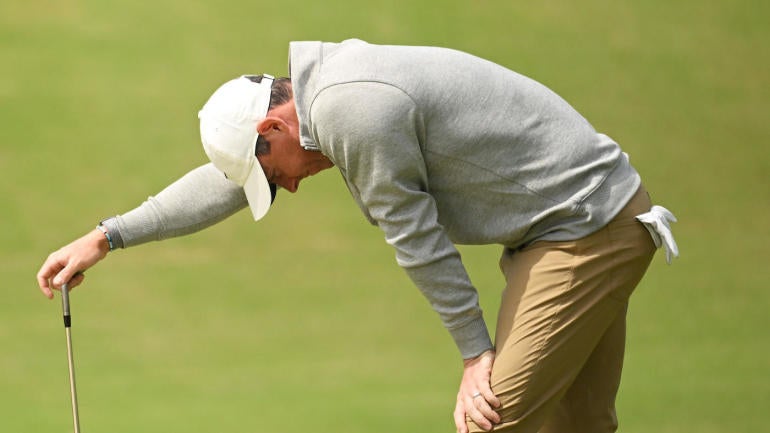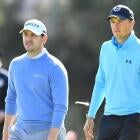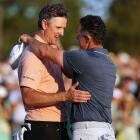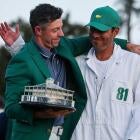
TULSA, Okla. -- The major championship season is halfway over, which is both stunning and also sad. After a terrific Masters in April, the PGA Championship ended in a thrill with an instant-classic playoff between Justin Thomas and Will Zalatoris. The Southern Hills redesign stood up to its first major championship, and it's likely to get another one in the future given its history of winners and the weight of its most recent champion.
As is true at every major, we learned a lot about the landscape of the sport. Thomas made a historical leap, which was the primary takeaway, but there's plenty more to digest as well. With the U.S. Open just three weeks away, I jotted down a few notes on the primary players in this PGA Championship and how we should think about them going forward.
At one point on Sunday afternoon, as the hamburger smoke, Oklahoma wind, anxiety and thrill closed in on the leaders, I looked down the chute and up the hill at the crowd on No. 18. It was about to erupt for J.T.'s second major win, and just behind him, the marshals would lose contain on a crowd desperate for something special trying to get as close as it feasibly could.
I can't believe this is the same tournament I watched for the first three days, I thought, and I can't believe they call this thing a job.
Here are 11 takeaways from Southern Hills.
1. Modern art: Sunday night on the No Laying Up podcast, Max Homa called Thomas "the best player I've played with," and he could probably find a lot of company on the PGA Tour with that statement. J.T. is clearly the game's foremost modern artist, and one of the great thrills of this job is a front row seat to watch him paint. I was standing probably 100 yards in front of the tee box on No. 18 in regulation when he hit that bullet drive that rolled over itself, and it was so low off the tee that I simultaneously flinched and gasped. It's among the shots he hit late that I'll be thinking about for a long, long time.
These were all from JT's last hour of play on Sunday. He has every single shot. 🎨 pic.twitter.com/uzoX9BF1or
— Kyle Porter (@KylePorterCBS) May 23, 2022
Though he exuded calm throughout the day (and especially in the playoff), he was trying to bend the golf world to himself on every single swing. The one on No. 18 in regulation stands out. By going at a ridiculous pin, he gave himself a chance at what would have been a walkoff birdie. He swaggered after it like Vince McMahon entering an arena, ripped his glove off and gritted expletives to himself through his teeth. Rarely are artists as pure as Thomas so doggedly competitive as well, and that combination is the reason why so many have prophesied so much for one of the great players in the post-Tiger Woods era.
2. Big-game hunter: As a professional, Zalatoris has been a good player. As a major championship golfer, he turns into skinny Ben Hogan. Zalatoris now has five top 10s at majors in seven starts as a professional, and one of the other ones was a withdrawal after he got injured at last year's Open Championship.
Zalatoris strokes gained per round overall as a pro: 0.81
— Kyle Porter (@KylePorterCBS) May 23, 2022
Now at the majors ...
2020 U.S. Open: 3.3
2021 Masters: 3.7
2021 PGA: 2.4
2021 U.S. Open: -0.9
2021 Open: WD
2022 Masters: 3.2
2022 PGA: 3.8
Insane! https://t.co/dr4YLTeWut
He's going to win a lot over the course of his career, if only because he has something inside of him that all the great champions do. That indefinable thing that seems to be the difference between good Tour pros and great historical champions.
"[My dream has never been] to be world No. 1 or anything like that," said Zalatoris. "It's been to win a major. ... I love [the pressure]. This is what you live for."
3. Rory's remorse: Rory McIlroy shot 65 on Thursday. If he played the last three days in even par, he would have been in a playoff with Thomas and Zalatoris. Hell, he got it all the way to 4 under through his first five holes on Sunday, so if he plays the last 13 holes in 1 under, he's also in the playoff. It was a big miss sitting at a position (out in front after 18 holes) from which he's not used to missing. McIlroy skipped media after both Saturday and Sunday, and when I asked how he was feeling compared to the elation of his final-round 64 at Augusta National, he offered a one-word summation: "Dejection." What sunk him for the week? Southern Hills' mighty par 3s. He played them in 7 over compared to the 9 under he threw at the other 56 holes.
4. The importance of Bones: J.T. spoke glowingly about how caddie Jim "Bones" Mackay got in his ear on Saturday night after a disappointing 74 in Round 3. Bones simply told Thomas to be more positive. I wrote about that here, but I wanted to expound on it. The NLU boys were discussing the difference between Bones and J.T.'s old caddie, Jimmie Johnson. It's apparent, just from observing how J.T. speaks with and about them, that he views them differently. If Johnson was formerly an excellent employee, Bones is that and more. J.T. seems to view him as more of a mentor and friend than he did Johnson. Why wouldn't he? Bones has seen and done it all at the highest level with one of the 15 best players ever for a quarter of a century. When Johnson was on the bag, there was never any doubt who was in charge at all times. Now, though, J.T. clearly trusts Bones enough to sometimes give him the reins and let him play both mental and physical tour guide across the landscape of professional golf.
"I'm fully confident in saying that I wouldn't be standing here [with the trophy] if he didn't give me ... a talk, if you will [on Saturday night]," said Thomas after his playoff win. "He was just like, 'Dude, you've got to be stop being so hard on yourself. You're in contention every single week we're playing. I've had a lot of chances to win tournaments, and it's a hard golf course. It's a major championship. You don't have to be perfect. Just don't be hard on yourself. Just kind of let stuff happen, and everything is trending in the right direction. So, just keep staying positive so that good stuff can happen'"
That's not something I believe Johnson would (or could) have done, and it probably won J.T. the tournament.
5. Game of literal inches: Mito Pereira's heartbreak happened slowly at first and then suddenly quite fast. The Chilean had a 13-foot putt on No. 17 to take a two-stroke lead to the final hole of a major championship. He left it maybe two revolutions short, hit a check-swing drive off the tee on No. 18, and that was that. In the span of 10 minutes, he went from probably winning the golf tournament to not even making a playoff. (He also lost about $1.8 million moving from first to T3.) My CBS Sports colleague Patrick McDonald wrote beautifully bout Pereira here, and I thought Chris Solomon said it well in this tweet: "if there wasn't the risk of that [double on No. 18] happening to begin with, there wouldn't be much of a point to being a golf fan." The hope is that, as Thomas said on Sunday night, this is something from which he learns and wins because of in the future.
"If you're able to channel that and look back at it later or whenever the time is when you're kind of, I guess, calmed down and to reflect, he'll be able to learn from it and be better from it," said Thomas. "I know that down the road, whether it's this year or years to come, if he's standing on 18 with a one-shot lead in a major, he's going to feel more comfortable because he's going to drawback on this experience."
6. Inconsistency is rewarded: I couldn't stop thinking after this PGA Championship about how golf disproportionately rewards inconsistency more than probably any other professional sport. The two best golfers across the first two majors are McIlroy and Zalatoris. Their combined major victories (and PGA Tour victories) this calendar year: 0. On the other hand, Pereira didn't have a top 10 anywhere in the world since last September, but he nearly won at Southern Hills. That has to be extraordinarily frustrating for the top players in the world, but it's also part of what makes this sport so compelling.
Low aggregate score through the first two majors.
— Kyle Porter (@KylePorterCBS) May 23, 2022
Rory: -9
Zalatoris: -8
JT: -6
Cam Smith: -5
Lowry: -3
Fitzpatrick: -1
Fleetwood: -1
Nobody else is better than even.
7. Tiger's tank: Woods withdrew from the PGA Championship on Saturday evening not because he was dropping on the leaderboard -- he has too much respect for the majors to care about that -- but because he had nothing left to give Sunday. There has been a lot of hand-wringing about how Tiger should take some time away and rest up until he's 100% ready to roll at the big ones. The problem with that is that I think he actually might be 100% or at least his version of it. There's a world in which this is just what he is as a golfer, which is sad, of course, and leads to a lot of unknown in major weeks (for both him and us).
Perhaps he could take the next year off, come back at the 2023 Masters and feel marginally better than he does right now, but I think the reality is that his body is a lottery, and he's just going to hope he gets the best from it across four straight days. That he made the cut at the first two majors when Jordan Spieth, Scottie Scheffler, Patrick Cantlay, Dustin Johnson, Xander Schauffele and Brooks Koepka did not is remarkable.
"He made the cut in his second major in a row, what, a year and a half after being in a gruesome car accident, broken leg?" said Thomas after winning. "I don't think you guys understand how unbelievable that is. He's a freak of nature. It's mind-blowing the things that he can do with his mind. I didn't play during his prime, but from the times I've been out here and him winning the Masters in 2019 and winning the Tour Championship, him making the cut these last two tournaments for ... some of the conditions he was in last year, it's absurd. Like beyond absurd."
8. Shaky ground: My friend Kevin Van Valkenburg wrote a Saturday night column that buried McIlroy and Thomas. He got ratio'd into space once Thomas completed his comeback, but he also wasn't wrong. The column still stands up even if nobody will admit it. Here's why: If you're going to rely on all-time meltdowns like J.T. got from the top of the leaderboard, your major resume probably isn't going to be long. Props to Thomas for being there to clean up the mess when everybody faltered, but playing yourself to the brink of being completely submarined on Saturday evening is not the most efficient way to collect major championships. One thing neither of us considered enough, however, is how Thomas was going against, as one person on Twitter put it, a Korn Ferry All-Star team on Sunday. That group of golfers was just not equipped with the right equipment to survive when oxygen levels plummet late on major Sundays.
"I just remember how tough it was, and I remember how tough it is now to win," said Thomas. "I knew I was going to be nervous and I knew they'd be feeling the exact same thing."
9. Harder to win? The crux of my Sunday column on J.T. was his newfound appreciation for how difficult it is to vacuum up the big ones. He insinuated that that reality is what pulled the emotion out of him on the 18th green on Sunday, and Homa summed it up well when he said, "It's crazy when you think about how hard it must be to win majors if that kid can't rack 'em up."
All four major championships are now held by golfers in their 20s, and Thomas is actually the oldest of that group. I participated in an interesting thread Sunday morning in which debate raged over whether golf is harder or easier than it used to be. My conclusion is that it's easier to be good and more people are incentivized to be good, which means it's harder than ever to win. Also, because the group of players like Pereira and Cameron Young is always expanding, it has to put mental pressure on the biggest names knowing they have to be close to perfect to meet their and our expectations. It's taxing when somebody is shooting their one career shot and taking the chances that reflect that, and you're expected to not only hold off the rest of the field but run down that player as well. That's a broad, sweeping generalization, but it paints the picture of why winning in 2022 is harder than ever.
10. J.T.'s history: Of the following group, who ends up with more major championships: Thomas (currently with 2), Spieth (3), Koepka (4), McIlroy (4), Collin Morikawa (2), Johnson (2), Jon Rahm (1), Bryson DeChambeau (1) or Scheffler (1)? You could make a pretty good argument for any of them, but I would probably narrow it to McIlroy, Koepka, Thomas, Spieth and Rahm. If Koepka or McIlroy win one more, that's probably a wrap, but if not I legitimately think J.T., Rahm or Spieth can catch and surpass them. If you made me pick, I'd probably go with Rahm.
11. Can't control outcomes: This got brought up to me Monday, and it's a great point. If Scheffler collapses at the Masters like Pereira did at the PGA Championship, aren't we talking about how great it was that McIlroy hung around and charged late like J.T. did this week? The opposite is true, too. If Young shoots 67 on Sunday, we're talking about how J.T. kicked the tournament away on Saturday (see above). Golf is maddening because the margins are like razors. Thin, unnerving and they cut going both ways.
Golf talk is so funny. If Mito hits one more good chip or one more straight 3 wood? People are dumping on JT’s Saturday…instead he’s now a generational player. Classic.
— Roberto Castro (@cicioCASTRO) May 23, 2022
![[object Object] Logo](https://sportshub.cbsistatic.com/i/2020/04/22/e9ceb731-8b3f-4c60-98fe-090ab66a2997/screen-shot-2020-04-22-at-11-04-56-am.png)


















